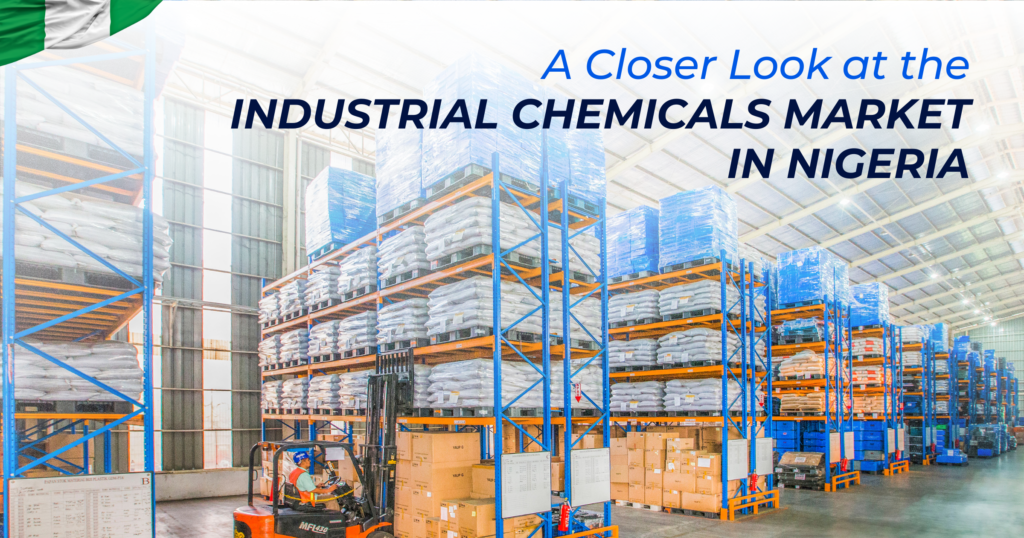
Nigeria’s industrial sector, a vital component of the nation’s economy, has significantly transformed over the past decades. As Africa’s largest economy, Nigeria’s industrial landscape is diverse, encompassing manufacturing, agriculture, oil and gas, and mining. The growth of these industries has been pivotal in driving the country’s economic development, contributing substantially to its Gross Domestic Product (GDP).
The Evolution of Nigeria’s Chemical Market
Nigeria’s chemical market has evolved significantly over the decades. In the 1970s and 1980s, government initiatives expanded chemical plants to support manufacturing, particularly in textiles and food processing.
The 1990s brought economic liberalization, attracting foreign investments that modernized production facilities and intensified competition. This era shifted focus toward specialized chemicals to cater to a diversifying industrial base.
In the early 2000s, the government’s push for economic diversification emphasized non-oil sectors, increasing the demand for industrial chemicals. This period also introduced stricter regulations on chemical production and usage, reflecting growing environmental consciousness.
Recent Developments in Nigeria’s Chemical Industry
The Nigerian chemical industry has recently been characterized by a push towards more sustainable and efficient production methods. There has been an increase in local production of basic chemicals, driven by the government’s policy to encourage local content and reduce import dependency. However, the industry still faces challenges such as inadequate infrastructure, fluctuating global oil prices affecting petrochemical production, and the need for more investment in research and development.
The historical context of Nigeria’s industrial chemicals market reveals a story of growth, adaptation, and resilience. From its humble beginnings to its current state, the market has played a crucial role in supporting the country’s industrialization efforts. It continues to evolve in response to both domestic and global economic trends.
Nigerian Industrial Chemical’s Current Market Landscape
The Nigerian industrial chemicals market features a dynamic mix of local and international players. Major global chemical companies invest directly or partner with local firms, bringing advanced technology and expertise that significantly enhance market growth. Meanwhile, local chemical companies focus on specific niches, leveraging regional knowledge to meet market demands.
High-demand chemicals include petrochemicals like ethylene and propylene, essential for plastics and synthetic materials. Additionally, agrochemicals, such as fertilizers and pesticides, thrive due to Nigeria’s strong agricultural sector.
The industrial chemicals market is steadily growing, driven by industrialization, population growth, and increasing consumer demand. Government policies aimed at boosting local manufacturing and reducing import dependency further influence this expansion.
Factors driving demand include the country’s push for industrialization, economic diversification away from oil, and urbanization, which heightens the need for packaged foods, pharmaceuticals, and consumer goods. Overall, Nigeria’s industrial chemicals sector offers numerous opportunities for expansion and innovation.
Supply Chain Dynamics in the Nigerian Industrial Chemical Market
The supply chain dynamics of the industrial chemicals market in Nigeria are a critical aspect of the sector’s overall health. Addressing the challenges and capitalizing on the opportunities for improvement will be vital to ensuring the market’s sustainable growth and its ability to support Nigeria’s broader industrial ambitions.
The supply chain for industrial chemicals in Nigeria is a complex network that involves various stages, including raw material sourcing, production, distribution, and end-use. The chain is influenced by local and international dynamics, as Nigeria imports a significant portion of its industrial chemicals while also developing its local production capacity.
Local production of industrial chemicals in Nigeria is gradually increasing but faces challenges like limited infrastructure and the need for more investment in technology. Despite these hurdles, government policies aim to promote local content and reduce import dependency. However, Nigeria still relies heavily on imports, exposing it to global market fluctuations and foreign exchange risks.
The supply chain suffers from inefficiencies due to inadequate transportation and storage facilities, regulatory hurdles, and market volatility. Yet, opportunities for improvement exist, including investing in infrastructure, adopting digital technologies for better coordination, and fostering regional collaboration within ECOWAS for a more resilient supply chain.
Regulatory Environment of the Nigerian Industrial Chemical Market
The regulatory environment in Nigeria significantly influences the industrial chemicals market, balancing industry growth with public health and environmental protection. Key regulatory bodies, like the Standards Organisation of Nigeria (SON) and the National Environmental Standards and Regulations Enforcement Agency (NESREA), enforce compliance with safety and quality standards, focusing on safe handling and disposal.
Increasingly stringent environmental regulations aim to minimize pollution and promote sustainable practices. While regulatory compliance can challenge companies, requiring investments in infrastructure and technology, it also offers opportunities to enhance market reputation and align with global standards.
Looking ahead, tighter controls on hazardous chemicals and a greater emphasis on sustainability are expected to shape the market, influencing investment and operational strategies.
The Role of Innovation and Technological Advancements in Nigeria’s Industrial Chemicals Market
Technological advancements are increasingly shaping Nigeria’s industrial chemicals market by enhancing production, distribution, and utilization processes. Emerging trends include adopting green chemistry, which minimizes waste and hazardous substances, alongside automation and digitalization, improving precision and product quality.
In distribution, digital platforms streamline inventory management and logistics, while blockchain technology offers secure tracking from production to end-user, including waste management.
Moreover, innovations in quality control through sophisticated analytical tools ensure compliance with regulatory standards, bolstering customer trust in product safety.
Looking ahead, the integration of artificial intelligence (AI), machine learning, and the Internet of Things (IoT) promises to further revolutionize the industry, enabling predictive manufacturing processes and smarter supply chain management.
Future Outlook and Trends in Nigeria’s Industrial Chemical Market
The future outlook for Nigeria’s industrial chemicals market is promising, with expectations of continued growth and expansion. This optimism is fueled by the ongoing industrialization efforts, increasing domestic demand, and the government’s commitment to diversifying the economy. The market is poised to play an even more significant role in Nigeria’s economic landscape, particularly as it seeks to reduce its reliance on oil revenues.
Emerging Trends in the Market
Sustainability is becoming paramount in the chemical industry, with a strong focus on green chemistry to minimize environmental impacts. Companies are investing in eco-friendly products and processes. Concurrently, digitalization is accelerating, integrating technologies like AI, IoT, and blockchain to enhance efficiency, traceability, and quality control.
Efforts to boost local production are intensifying, promoting self-sufficiency and reducing import dependency while creating jobs. Additionally, as Nigeria strengthens its chemical sector, regional integration under the African Continental Free Trade Area (AfCFTA) will open export opportunities, enabling Nigerian companies to access broader African markets and drive economic growth.
Challenges and Opportunities in Nigeria’s Industrial Chemical Market
Nigeria’s industrial chemical market faces several challenges, including inadequate infrastructure, global economic fluctuations, and stringent environmental and safety standards. However, these challenges also present opportunities for innovation, collaboration, and development.
Inadequate transportation and power supply hinder production efficiency; however, investing in infrastructure can attract more investors and enhance competitiveness.
The market’s vulnerability to oil price fluctuations can be mitigated by diversifying the chemical product base and exploring renewable sources, opening new markets.
While smaller companies may struggle with compliance costs, meeting environmental standards can improve reputation and create export opportunities.
Finally, embracing technological advancements, despite the investment required, can foster innovation and position Nigerian firms as leaders in Africa’s chemical market.
Role of Stakeholders in the Development of the Nigerian Industrial Chemical Market
The successful realization of these future trends will require the concerted efforts of various stakeholders, including the government, private sector, and international partners. Policies that support industry growth, investment in research and development, and partnerships for technology transfer will be key to harnessing the full potential of Nigeria’s industrial chemicals market.
The Government
- Policy and Regulation: The government plays a crucial role in creating a conducive environment through supportive policies, tax incentives, and streamlined regulatory processes.
- Infrastructure and Investment: Public investment in infrastructure and research facilities is essential to stimulate industry growth and attract private investment.
Private Sector
- Investment and Innovation: Companies must invest in technology, research and development, and human capital to stay competitive and meet market demands.
- Sustainability Practices: Adopting sustainable practices and green chemistry can differentiate companies and appeal to a growing segment of environmentally conscious consumers.
International Partners
- Technology Transfer: Collaboration with international partners can facilitate technology transfer, providing access to advanced technologies and expertise.
- Market Access: Building relationships with international partners can help Nigerian companies access new markets and participate in global supply chains.
Academia and Research Institutions
- Research and Development: Collaborations between industry and academia can drive innovation, with research institutions playing a key role in developing new chemical products and processes.
- Skill Development: These institutions are also crucial for skill development, providing the industry with a skilled workforce with the latest knowledge and techniques.
The Need for Environmental Considerations and Sustainability
In recent years, there has been a heightened awareness of the environmental impact of industrial activities, including the chemical sector. This has led to an increased focus on sustainability and environmental responsibility in the Nigerian industrial chemicals market. Companies are now more than ever expected to adopt practices that minimize environmental harm and promote sustainability.
Environmental Challenges Specific to the Chemical Industry
- Waste Management: The chemical industry generates a significant amount of waste, which, if not properly managed, can lead to soil and water pollution.
- Emissions and Air Quality: The production of chemicals can result in the emission of harmful gases and particulates. Impacting air quality and contributing to climate change.
- Resource Consumption: The industry is also resource-intensive, consuming large amounts of water and energy, which can strain local resources and ecosystems.
Sustainable Practices and Innovations
- Green Chemistry: This approach focuses on designing products and processes that reduce or eliminate the use and generation of hazardous substances. It’s gaining traction in Nigeria to make the chemical industry more sustainable.
- Energy Efficiency: Implementing energy-efficient processes can significantly reduce the industry’s carbon footprint. This includes the use of renewable energy sources and the optimization of production processes to consume less energy.
- Water Conservation: Techniques such as recycling and reusing water in production processes are becoming more common, helping to conserve this vital resource.
Regulatory Framework for Environmental Protection
- Government Regulations: The Nigerian government is implementing stricter regulations to ensure that chemical companies adhere to environmental standards. This includes regulations on waste disposal, emissions, and resource usage.
- Compliance and Enforcement: Ensuring compliance with these regulations is crucial. This involves regular inspections, monitoring, and penalties for non-compliance.
The Role of Industry in Environmental Stewardship
- Corporate Responsibility: Companies are increasingly recognizing their role in environmental stewardship. This involves complying with regulations and going beyond compliance to implement best practices in sustainability.
- Community Engagement: Engaging with local communities and stakeholders is important for understanding and mitigating the environmental impact of chemical operations. This includes education programs, community consultations, and transparency in reporting environmental performance.
Future Directions in Sustainability
- Innovation in Sustainable Chemicals: There is a growing market for sustainable chemical products, such as biodegradable materials and eco-friendly alternatives to traditional chemicals.
- Circular Economy Models: Adopting circular economy principles. Where waste is minimized and reused and recycled materials is a future direction for the industry. This approach can transform waste streams into valuable resources, creating a more sustainable and efficient industry.
WRAPPING UP
Are you passionate about Africa’s growth?
Then one area you need to pay attention to is our industries. Africa’s industrial sector has vast potential due to the current state of Africa’s mass industrialization and our teaming youth population.
This sector is driven by chemicals and raw materials that combine to create solutions that ease our daily lives.
This is why Matta exists. We look forward to a future where Africa’s industrialization will scale. For this to happen, we first must ensure adherence to the top-quality standards and that the chemical needs are consistently met. By doing this, industries will run smoothly and, in turn, impact the lives of everyday Africans.
Sign up to Matta’s chemical marketplace today and experience the world of chemicals at your fingertips.
Thank you for reading





